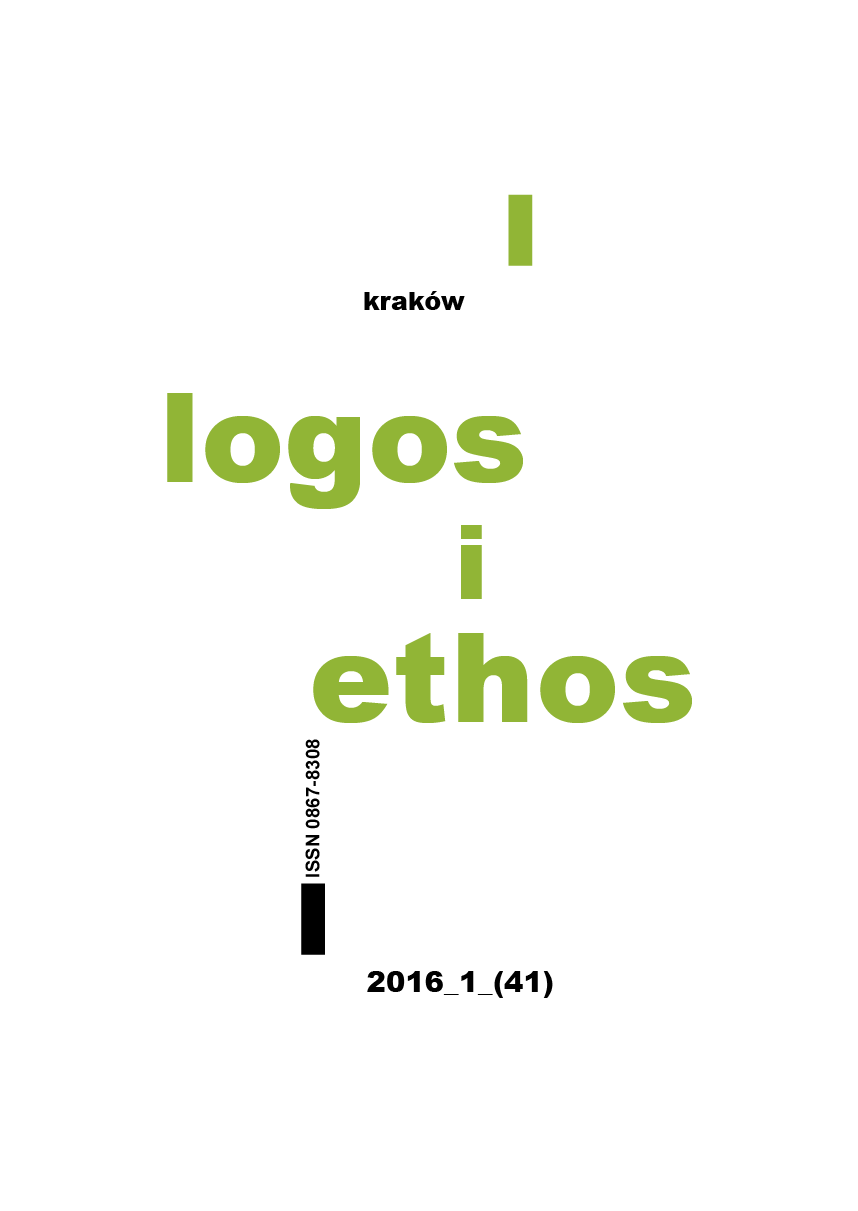From experience to gift. Reflections on life as disclosed to consciousness. Part 1
DOI:
https://doi.org/10.15633/lie.1796Słowa kluczowe:
life, phenomenology, event, experience, encounterAbstrakt
In the following meditation I investigate how life is disclosed to human consciousness. I use phenomenology to avoid reducing life to the natural sphere has to avoid the common mistake of objectifying it, that is, of taking life as something, as a property of being. A more justified phenomenological approach that remains open to the supernatural character of life would focus rather on how life is given to consciousness. The starting point for my analysis is the observation that before life is thematically given as such it is somehow always already disclosed in any conscious experience. Life gives itself in a tacit and discreet way.I offer an itinerary: from the point of a deepened understanding of the silent disclosure of life, towards a reflected recognition of life as divine gift.
Before any philosophical investigation begins, the first impediment itself present in the drama of life that one must overcome is evil. The phenomenon of life is overshadowed by evil and its meaning is fragmented.
Life remains unperceived in those experiences that are not thematically concerned with life as such. It is an explicitly phenomenological task to discover those formal aspects that reveal the nature of life in all conscious events prior to any ‘experience’ in the full sense. Investigating the process of transforming a ‘conscious flux’ as an immediate and yet unreflected experience to a reflected one with an already clarified specific meaning is indispensable to see how life that is originally given remains unnoticed until it is manifested in experiences through which it is thematically given. I shall also investigate the different modes of reduction of the originally given life to experience.
In my conclusion I argue that despite the general fragmentation life presents itself to consciousness there is a profound unity of ‘vital‑experiences’: they all refer to the same ultimate origin, i.e. the self‑disclosure of life as such.
Bibliografia
Beckmann B., Phänomenologie des religiösen Erlebnisses. Religionsphilosophische Überlegungen im Anschluss an Adolf Reinach und Edith Stein, Würzburg 2003.
Bonaventure, Opera omnia, vol. 5, Quaracchi, 1891.
Carr D., Husserl’s problematic concept of life‑world, [in:] Husserl: expositions and appraisals, eds. F. A. Elliston, P. J. McCormick, Notre Dame 1977.
Chrétien J.-L., The unforgettable and the unhoped for, New York 2002 (Perspectives in Continental Philosophy, 26).
Derrida J., La voix et le phénomène. Introduction au problème du signe dans la phénoménologie de Husserl, Paris 1967 (Collection Épiméthée).
Dilthey W., Der Aufbau der geschichtlichen Welt in den Geisteswissenschaften, Göttingen 1992 (Wilhelm Dilthey, Gesammelte Schriften, 7).
Gilson E., Die Philosophie des hl. Bonaventura, Köln–Olten 1960.
Habermas J., Theorie des kommunikativen Handelns, Bd. 1: Handlungsrationalität und gesellschaftliche Rationalisierung, Bd. 2: Zur Kritik der funktionalistischen Vernunft, Frankfurt am Main 1981.
Heidegger M., Beiträge zur Philosophie. Vom Ereignis, Frankfurt am Main 1989 (Gesamtausgabe, 65).
Heidegger M., Das Eregnis (1941/42), Hrsg. F.-W. von Herrmann, Frankfurt am Main 2009 (Gesamtausgabe, 71).
Heidegger M., The phenomenology of religious life, [Bloomington] 2010.
Henry M., Voir l’invisible, [Paris] 1988.
Henry M., Incarnation, [Paris] 2000.
Hildebrand D. von, Das Cogito und die Erkenntnis der realen Welt. Teilveröffentlichung der Salzburger Vorlesungen Hildebrands (Salzburg, Herbst 1964): “Wesen und Wert menschlicher Erkenntnis” (7. und 8. Vorlesung), “Aletheia” 6/1993–1994 (1994), p. 2–27.
Hildebrand D. von, Ästhetik, 1. Teil, Stuttgart 1977 (Gesammelte Werke, 5).
Hildebrand D. von, Die Idee der sittlichen Handlung, Darmstadt 19692.
Hildebrand D. von, Die Umgestaltung in Christus. Über christliche Grundhaltung, Regensburg 19715 (Gesammelte Werke, 10).
Hildebrand D. von, Ethics, Chicago 19782.
Hildebrand D. von, Ethik, Stuttgart 1971.
Hildebrand D. von, Moralia. Nachgelassenes Werk, Regensburg 1980 (Gesammelte Werke, 9).
Hölderlin F., Brot und Wein (1800–1801).
Husserl E., Die Krisis der europäischen Wissenschaften und die transzendentale Phänomenologie. Eine Einleitung in die phänomenologische Philosophie, Hrsg. W. Biemel, Nachdruck der 2. verb. Auflage, Haag 1976.
Husserl E., The crisis of European sciences and transcendental phenomenology: an introduction to phenomenological philosophy, [Evanston] 1970.
Husserl E., Zur Phänomenologie des inneren Zeitbewusstseins, Hrsg. R. Boehm, Haag 1966 (Husserliana: Edmund Husserl Gesammelte Werke, 10).
Khurana T., “…besser, dass etwas geschieht”. Zum Ereignis bei Derrida, [in:] Ereignis auf Französisch: von Bergson bis Deleuze, Hrsg. M. Rölli, München 2004, p. 235–257.
Löwith K., Heidegger – Denker in dürftiger Zeit, Stuttgart 1983.
Marion J.-L., La phénomène saturé, [in:] Phénomenologie et théologie, éd. J.-F. Courtine, Paris 1992.
McCormick P., The negative sublime, [Heidelberg] 2003.
Martin Heidegger: Sein und Zeit, Hrsg. T. Rentsch, [Berlin] 2015 (Klassiker Auslegen, 25).
Saint Augustin, Confessions, trans. by H. Chadwick, Oxford 1991.
Schaeffer R., Erfahrung als Dialog mit der Wirklichkeit. Eine Untersuchung zur Logik der Erfahrung, Freiburg 1995.
Seifert J., Karol Cardinal Wojtyła (Pope John Paul II) as philosopher and the Cracow/Lublin School of Philosophy, “Aletheia” 2 (1981), p. 130–199.
Seifert J., Back to “things in themselves”. A phenomenological foundation for classical realism, London 1987.
Thomas Aquinas, De aeternitate mundi, http://www.fordham.edu/halsall/basis/aquinas‑
eternity.html, trans. by Robert T. Miller, 1991, 1997.
Wojtyła K., Love and responsibility, San Francisco 1993.
Wojtyła K., The acting person, Boston 1979.
Pobrania
Opublikowane
Numer
Dział
Licencja
Autorzy publikujący w czasopiśmie udzielają jego wydawcy zgody o następującej treści:
- Autor zachowuje autorskie prawa majątkowe do utworu, a jednocześnie udziela wydawcy czasopisma zgody na jego pierwszą publikację w wersji drukowanej i wersji online na licencji Creative Commons Uznanie autorstwa 4.0 Międzynarodowe oraz zgody na wykonywanie opracowań, w tym przekładów.
- Autor ma możliwość udzielania zgody niewyłącznej na opublikowanie utworu w wersji, która ukazała się w czasopiśmie (np. zamieszczenia go w repozytorium instytucjonalnym lub opublikowania w książce), wraz z informacją o jego pierwszej publikacji w czasopiśmie.
- Autor może umieścić swój utwór online (np. w repozytorium instytucjonalnym lub na swojej stronie internetowej) jeszcze przed zgłoszeniem utworu do czasopisma.

